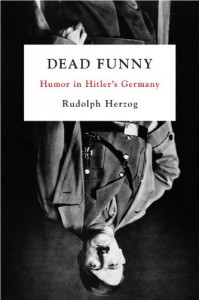18. Dead Funny: Humor in Hitler’s Germany by Rudolph Herzog translated by Jefferson Chase
Category: 50 Books

This very short book covered more ground than I thought it would. The author starts in 1933 and ends with Mel Brooks’ The Producers and Roberto Benigni’s Life if Beautiful. The book itself reads like an interesting textbook. I’m not going to blame this on the fact that the book is translated because that is not the problem. The problem is the subject matter, and I’m not talking about the history of the Third Reich either. I’m talking about jokes.
Political humor, at it’s very best, is only funny for a very short time, and even then, how funny is it? Not that funny, is my point. Also what’s not funny? Racist jokes. So the problem here is that most of the humor that is discussed in this book is of course, political humor and racist jokes. When two of the unfunniest types of humor are being disected and explained, even if it’s putting them into their cultural relevance, it’s tedious. Which is why I compare it to a textbook. This is not to say the book is boring. It is not. It’s fascinating.
But it isn’t entertaining. If you’re not into history or historical popculture, I’d stay away from this book. However, if you do like history and if you’re interested in any way about humor during the Third Reich, who used it and how and why, get this book. It’s very short, very readable, the subject matter is engaging, and had me thinking about it after I’d put the book down. The way the people used political jokes and the establishment used racists jokes was absolutely fascinating to read about. To think about people, comedians, actors, being put to death for telling a joke or acting in a sketch that made fun of the government? Terrifying.
One thing I found surprising about the book is that when the 1960s and ’70s are discussed, there’s no mention of Monty Python’s Flying Circus. I’m certain they made fun of Hitler. It’s curious that their sketches aren’t mentioned.
Tags: nonfiction
No Comments



